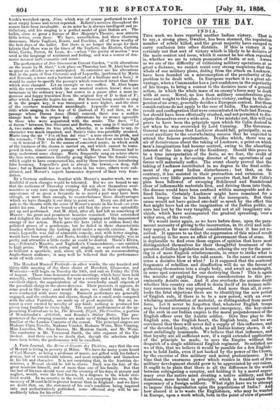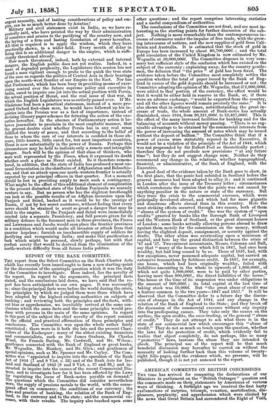TOPICS OF THE DAY.
INDIA.
Tans week we have reported another Indian victory. That is to say, a strong place CFwalior, has been stormed, the regulation number of rebels killed, and the great majority have escaped to carry confusion into other districts. If this is victory it is certainly not that sort of victory which is likely to be decisive of the mam contest and issue' which it cannot be too often repeated is, whether we are to retain possession of India or not. Aware as we are of the difficulty of criticising military operations at so great a distance, we cannot resist very strong suspicions that the whole of our military plans, dating from the attack on Lucknow, have been founded on a misconception of the peculiarity of the problem to be dealt with. In European warfare it is a great ad- vantage, when a Commander has a just confidence in the superiority of his troops, to bring a contest to the decisive issue of a general action, in which the whole mass of an enemy's force may be dealt with at once. Moral, no less than military considerations give force and weight to this plan. A decisive victory, ending in the dis- persion of an army, generally decides a European contest. But these considerations do not apply to the case of India. The materials of revolt and conflagration that were concentrated in Oude last Novem- ber should have been effectually crushed, and not permitted to dis- sipate themselves over a wide area. If we mistake not, this will yet prove to have been the principle upon which Sir Colin desired to act when he was overruled by Lord Canning. The Governor- General was anxious that Lucknow should fall, principally, as an event auxiliary to the overwhelming success that he expected to attend the famous proclamation. Besides which, there was an air of decisiveness about the taking of Lucknow, a point on which tnen's imaginations had become centred, owing to the absorbing interest of the late siege of the Residency. Should this prove to be a true interpretation of the facts, as we fear, the credit of Lord Canning as a far-seeing director of the operations of our forces will materially suffer. The event clearly proved that the taking of Lucknow contributed in no degree to the final settle- ment of the great Indian disturbances ; but that, on the contrary, it has assisted in their protraction and extension. It requires very little penetration to perceive that, had Sir Colin's plan been followed of sweeping Rohilcund and Bundelcund clear of inflammable materials first, and driving them into Oude, the disease would have been confined within manageable and de- fined limits. Certainly Lucknow might have remained for a much longer time in the hands of the insurgents. But their cause would not have gained one-half so much by the effect this fact might have had on the imagination of the Indian public, as ours has lost by the very tangible, and not at all imaginary mis- chiefs, which have accompanied the gradual spreading, over a wider area of the revolt.
We would insist again, as we have before done, upon the para- mount necessity of giving to the insurrection, in its civil and mili- tary aspect, a far more radical consideration than it has yet re- ceived. It appears to us that the suppression of this mixed revolt and mutiny is far more an affair of government than of arms. It is deplorable to find even those organs of opinion that have most distinguished themselves for their thoughtful treatment of the question of Indian legislation at home, echoing the cry for the pour- ing in of more English reinforcements, in order to strike what is called a decisive blow in the cold season. In the name of common sense a decisive blow at what ? Is it supposed that the scattered fragments of rebellion and disaffection will do us the favour of gathering themselves into a single body,. and await an onslaught, in some spot convenient for our destroying them This is again the mistake of applying European considerations to this pre- eminently Asiatic case. And it also overlooks the serious doubt whether this country can afford to drain itself of its human mili- tary resources in the way proposed. And more than all, it over- looks the fatal objections there are to identifying the new period of English rule, if there is to be a new period, with an over- whelming manifestation of material, as distinguished from moral force. Let it never be forgotten that, whatever English troops may be found necessary in the present emergency, the key-stone of the arch in our Indian empire is the moral preponderance of the English officer over the Asiatic soldier. Give free play to the English arm, the English heart, the English brain, and we are convinced that there will never fail a supply of this influence, and of the devoted loyalty, which, as all Indian history shows, it al- most unfailingly commands. We believe that that influence, and that loyalty are all sufficient now, if a rapid extended application of the principle be made, to save the Empire without the despatch of a single additional English regiment. So satisfied are we of this, that we believe it would be possible for a few English- men to hold India, even if not backed by the power of the Crown, by the exercise of this military and moral predominance. It is time that the enormous power which resides in this sort of free military development should grow to be appreciated by our rulers. It ought to be plain that there is all the difference m the world between subjugating a country, and holding it by a moral supre- macy over the native mind creating a native soldiery, and that dominion, more brutal in principle, which is founded upon the supremacy of a foreign soldiery. What right have we to attempt to impose this degradation upon the populations of India? And how absurd it is to waste the Englishmen, who may be wanted in Europe, upon a work which, both in the point of view of present urgent necessity, and of lasting considerations of policy and em- pire, can be so much better done by Asiatics!
' Military and civil statesmen exist in India, as we have re- peatedly said, who have pointed the way by their administration of countries and armies to the pacifying of the country now, and the laying of a firm and lasting foundation of power hereafter. All that is required is to apply the wisdom, which they have practically shown, to a wider field. Every month of delay in
i
aoing this s an additional danger to the empire, which is safi- ciently threatened already. How much threatened, indeed, both by external and internal dangers, the English public does not yet realize. Indeed, in a maze of degraded perplexity, the Legislature this session has not found a man vigilant enough to probe to the quick the true state of the case as regards the politics of Central Asia in their bearings upon the north-west frontier of our Empire in the East. Nor has that Parliament, which has been busy in providing means of exer- cising control over the future supreme policy and executive in India, eared to inquire one jot into the actual position with Persia, the actual position of Herat, and the real issue of that war' in which the English Legislature was so entirely passed over. If Mr. Gladstone had been a practical statesman, instead of a mere pro- moted Oxford first-class man, he would have followed up his in- quiries into the Persian war as a fact of importance, instead of devising illusory paper schemes for fettering the action of the exe- cutive hereafter. In the absence of Parliamentary action it be- hoves journalists to proclaim in the most emphatic manner, that the gravest doubts exist whether Persia has in any real sense fulfilled the treaty of peace, and that according to the belief of those to whom the care of our interests is confided in those ob- scure, little known, little cared for, but most important countries, Herat is now substantially in the power of Russia. Perhaps this circumstance may be held to indicate only a remote and intangible danger. Such will be the opinion of that class of thinkers, who were well represented by the Times, when it expressed its doubt whether such a place as Herat existed. Be it therefore remem- bered, in addition, that the state of India has produced a most un- usual fermentation in the chieftains of Affghanistan and Beloochis- tan, and that an attack upon our north-western frontier is actually expected by our principal officers in that quarter. Not a moment should be lost in providing amply to meet such a contingency. What might be the effect of this additional element of complication in the present disturbed state of the Indian Peninsula we scarcely venture to say., But no person who has the slightest forethought can look at the possible results of an Affghan incursion upon the Punjaub and Scind, backed as it would be by the prestige of Russia if not by her secret assistance, without feeling that every nerve should be strained to avert so great a danger that may be fatal to the empire. If the Punjaub and Scind were immediately erected into a separate Presidency, and. full powers given for its military defence to the foremost men in those provinces, the Freres and Lawrences and Jacobs would soon place the frontier provinces in a condition which would make all invasion or attack from that quarter hopeless ; furnish an inexhaustible supply of soldiers for pacifying and reorganizing India; and make that pacification a task which might be pursued, slowly perhaps, but with that perfect surety that would be derived from the elimination of the north-western difficulty from all future India politics.



























 Previous page
Previous page